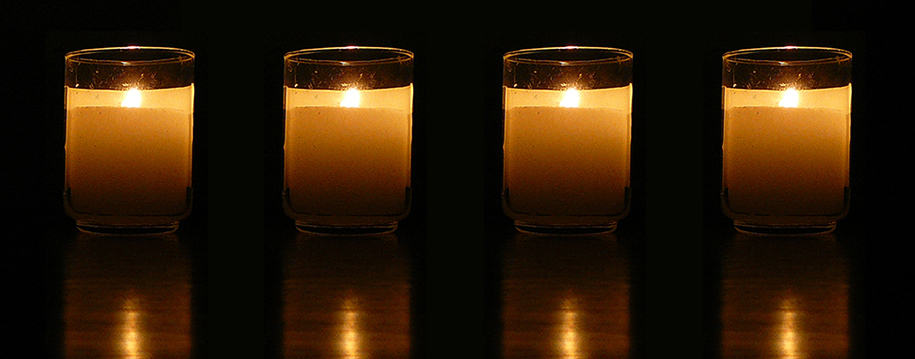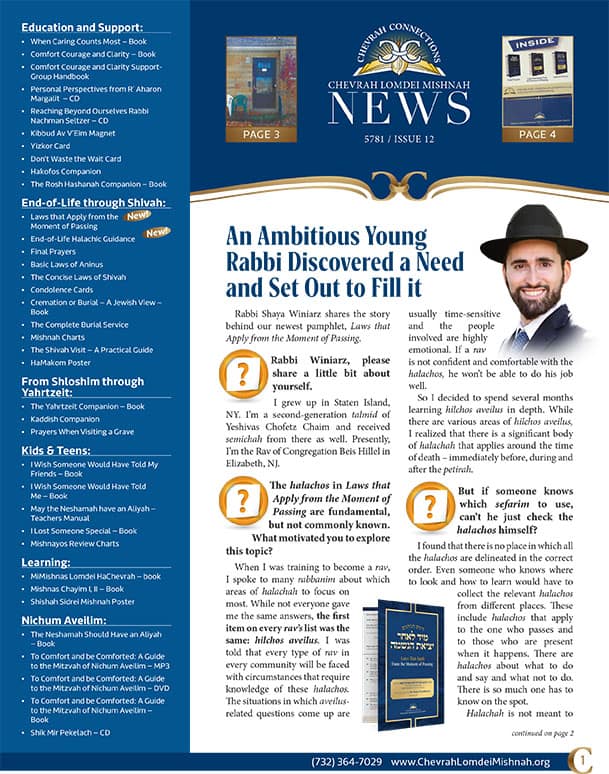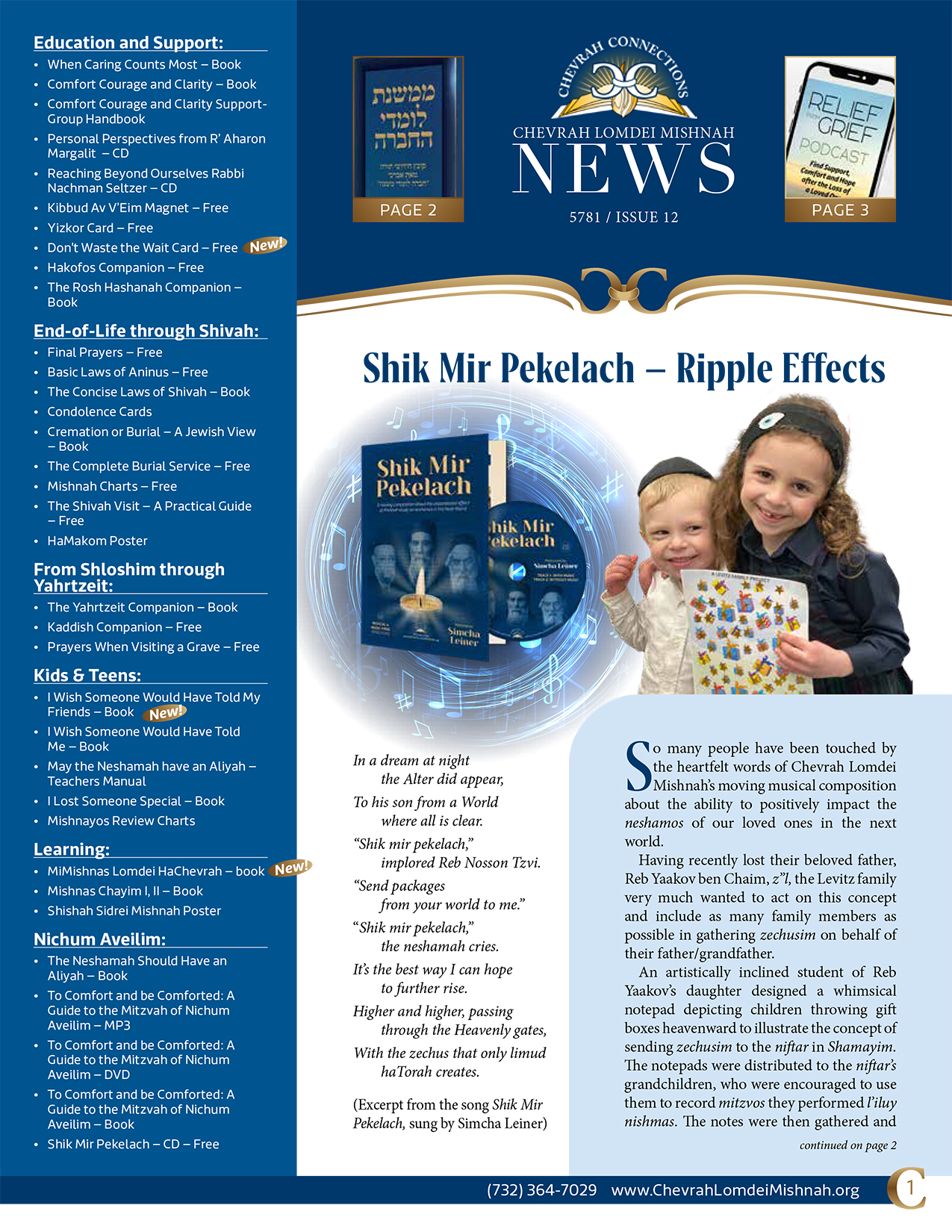
Originally published in the Ami Magazine
Grappling with Yizkor for My Not-So-Ordinary Family
I used to feel angry when it came time for Yizkor. I couldn’t understand why I needed to say it. A tefillah to remember? Really?
I need to say Yizkor four times a year to remember my deceased parents. Guess what? I remember them every day. I think about them, I talk about them and I yearn for them. So do I really need to say this special prayer? I didn’t think so.
Do I sound bitter? I hate to think of myself like that. But perhaps I was. I had been through a lot of painful losses in a very short amount of time. And maybe I needed the time to work through it all. It was when I started earnestly researching the topic of Yizkor in my work for Chevrah Lomdei Mishnah that I began to understand that Yizkor isn’t about remembering the niftar; rather, it is about asking Hashem to remember the niftar to give the neshamah greater merit.
I learned the following about the Yizkor prayer, which I included in I Wish Someone Would Have Told Me (published by Chevrah Lomdei Mishnah, page 257):
The shoresh (root) of the work Yizkor is zayin, chaf, reish, which means “to remember.” The tefillah is saying that Hashem should remember the departed for the good – to give them greater merit in Olam Haba. After pledging to give tzedakah in the merit of the niftar, we daven that their connection with Hashem and the eternal life of Olam Haba should be strengthened in the merit of our pledging (and giving) tzedakah: ְתהֵא נַפְשׁוֹ צְרוּרָה בִּצְרוֹר הַחַיִּים,which means, “His (or her) soul should be bound with the Bond of Life.” This Bond of Life refers not to life in this world, but to the real life of Olam Haba. Our actions (in this case, pledging and giving tzedakah) are the niftar’s only way to create more spiritual energy in the world, and we want him (or her) to earn that merit and the chance to get closer and closer to Hashem.
Yizkor never became something that I love doing. It still hurts. When I am walking to Yizkor and my neighbors are not, it hurts. When I am walking to Yizkor and I meet my neighbor who has been saying it longer than I have, I wonder why I had to become part of that group. And when I fall into step with another Yizkor-goer, I think, “Do you realize that you are fortunate to be saying it for only one parent and not two?”
But tonight, I sit here in a contemplative mood, thinking about my parents and my siblings who are no longer with us. I think about the past years without them. And although I ache for them, I wonder if it is their intervention that brought so much berachah into my life. Who knows the power that a neshamah can have in that upper world? It’s a world I know nothing about, and yet I have so much family there.
My mind falls into an almost-trancelike state as I remember.
I remember growing up as a very ordinary girl, just so regular. Not outstanding in any way, good or bad. I just was. But after my marriage, things changed. One day I realized that I wasn’t living that plain, ordinary life. My life became rather unusual as I dealt with one painful experience after another. Sickness and death had become part of my not-so-ordinary life.
With an aching heart, I remember all those I lost, and I realize that maybe my ordinary family was actually extraordinary.
My Brother
My brother Chesky was only 14 years old when he was niftar. It might seem that’s too young for me to be able to write about his outstanding qualities. But I can – because he had a strong desire to do what was right. And that is why, when Chesky was minutes from his petirah, the rav said he didn’t need to say Viduy. He had not had a chance to do aveiros. But Chesky insisted. He felt guilty for a wrong word he once said. So he said Viduy.
Chesky was someone who couldn’t be rushed when it came to davening. If he was planning a fun vacation day, the fun would wait until he was done davening. If he had an appointment in the hospital, he would finish davening with dveikus before he ran off. And when he was too weak to put on tefillin, he insisted on wearing them even if it meant that his older sister had to wrap them around his arm.
But he was only 14. And although I think he would have grown up to be a tremendous yarei Shamayim with a desire to do only ratzon Hasem, I can never know for sure. I will never be able to write about the emunah he probably would have shown, like my father, the chassadim he probably would have performed, like my mother, or his lack of jealousy, like my sister. And so I will tell you instead about his petirah.
“Please, Daddy,” he said. Can you give me that washcloth?”
“What for?” my father asked.
“Because the light is so strong. I can’t take it. I need to cover my eyes.”
It was a cloudy day, and there was no light on in the room. It was surely the light of Olam Haba that he was seeing.
“Please,” he begged. “The music is so loud. Can you please lower it?”
Music in a house with a dying child? There was no music on. But my grandfather explained that the Maharsha says that that as a heilige neshamah ascends to Shamayim, the malachim play music to welcome him.
Beginning on Wednesday he kept on asking to take a shower and to get dressed for Shabbos. He wanted to greet Shabbos properly and, yes, he felt that kedushah already on Wednesday as he was moving closer and closer to Olam Haba. He was niftar on erev Shabbos Kodesh.
My Father
It was hard to watch my father’s pained face after shivah. How he longed to have his son by his side! It is really only speculation, but I think the possibility is strong that his aching heart drove him into cardiac arrest.
My father wasn’t responding to any medicine, and the nurse gently suggested to my mother that someone should stay with her in the hospital to be there for her when he passes away. Then the doctor tried one last medicine. And my father survived. He was fine. He became the miracle man talked about at the hospital. He survived when it didn’t seem like that was a possibility.
And for the next 11 years he aimed for greater and greater heights.
It is hard to explain how someone seemingly so simple was anything but simple. He was a balabos, and that was how he portrayed himself. My father had so many nisyonos in his life –from a challenge as “mundane” as struggling with parnassah, to losing his son and watching his daughter and his wife slip away from cancer. But my father was a mevakeish. He looked for Hashem. He sought out Hashem and learned to lean on Him. No matter what the nisayon was, he was going to find Hashem.
My father was an ameil baTorah. As he wrote in his journal, “ameilus” means working to understand Hakadosh Baruch Hu in order to come to a certain level of shleimus…
My father reached that level of shleimus. Of that I have no doubt. Yet, he was so funny. Everyone loved to be around him. Because even when his heart was torn apart with pain, he somehow retained his smile and shared the joke that had everyone laughing.
As teenage girls we rolled our eyes at the fact that he didn’t let us go away for Shabbos, because “What is Shabbos without my children?” He seriously thought our sukkah was the most beautiful one on the block, and that we surely had the nicest Sedarim. But now I understand. His family values were so intrinsically part of him. He loved his family and found pure joy in us. It’s not a nerdy thing; it’s something to cherish. My father didn’t look at other families or other children. He loved us so much because to him we were so perfect.
And then one night he died. Just like that. He was here and then he wasn’t. They described it as “neshikas Hashem.” And perhaps that’s what it was. Because one thing everyone knew with the utmost clarity was that after my brother Chesky died, my father’s goal was to reach great heights.
My Sister
I don’t know how to describe my sister Esti. Should I say that she was a beacon of light, a ray of sunshine or a magnet to all people? That’s so cliché; it says nothing. And yet if you knew Esti, you would be nodding along at those words because it is just who she was.
She was a person who gave of herself in such a large capacity. She was surrounded by friends, yet she always sought out the less popular girls. She had a logical perspective that kept her focused. And the pain of her nisyonos didn’t let her feel jealousy toward others who had what she so badly wanted.
I remember walking through the front door after my third date with my would-be husband. I was flying high, and she started planning my wedding. I wanted to say, “Esti, I am younger than you and I just started dating. You have been dating for a few years, and you still aren’t married. You are supposed to be jealous, not so happy.” But as my mother used to say, “Esti doesn’t have a jealous bone in her body.” In such a trying situation she was truly happy. No jealousy. To this day, I am truly amazed.
I remember asking her to help me out financially. I had a plan to pay her back in a timely fashion, but my plan did not work out. When I tried to discuss it with her, she replied, “Someone once said that if you ever lend money to a family member, consider it a gift. Family members don’t usually pay back.” And that was that.
She didn’t carry around resentment, and she forgave easily. She was distinctively unique in the most exceptional way. Perhaps I described her using clichés; however, for her they ring true.
Esti was diagnosed in 2006, but she was a fighter and she was determined to win the fight. She worked, she dated, she got married. But the cancer wouldn’t let up. As it spread through her body, she was forced to slow down. Even in her weakened state, she kept her voice cheerful and upbeat, never wanting to worry anyone.
As she lay in the hospital during those last few hours of her life, the halls of Sloan Kettering filled up with friends and family. The staff wasn’t used to such crowds and wasn’t sure how to stop the flow of people. But if they would have known Esti, they would have understood. All the people coming to visit were certain they were Esti’s best friend. And Esti made sure to acknowledge each visitor with a smile.
She was a most beloved older sister. I miss her so much.
My Mother
My mother was more of an intellectual and was quieter in her avodas Hashem. She read books and internalized all the messages of Hashem running the world. It wasn’t an open discussion, but we knew that she worked on herself and on having pure emunah.
She was as honest as they come. She had no problem making a comment such as: “I am davening for myself, I am davening for Esti; so what does Hashem do? He takes my husband.” Some people might be taken aback by such forthrightness, but it was her way of expressing her pain and ultimately growing closer to Hashem from it.
My mother was full of chessed. She focused on helping with the small things that seemed almost inconsequential. She would drop off something for someone, saving that person a trip. She’d make a shidduch phone call to help someone out even though that person would never know about it. These little things made her into a big ba’alas chesed.
My mother was noble and dignified. Although she lost her husband and two children and was fighting for her life, she didn’t want to give up. She wanted to live. If not for her sake, then at least for the sake of her living children.
My mother had her simple way of being, and yet there were those who knew that she was more than what the average person could see. As someone said to me, “When my husband walked into the store where your mother worked, he turned to me and said, ‘Who is this woman? There is a shine to her face.’”
This woman was my mother who lost a husband and two children. This woman was my mother who despite her tremendous pain wanted nothing more than to continue to live.
But it wasn’t meant to be. In 2011, as the summer was coming to an end, her heilige neshamah joined the neshamos of her husband, son, and daughter.
My Thoughts
The house is quiet. The hour is late. But I sit here typing while the memories drift in and out of my consciousness. I feel cold even though it is warm. I feel pain despite the years that have passed. I remember what I once had and I long to have it again.
The memories won’t stop coming. There are images of my parents and siblings swirling all around me. I think of my oh-so-simple family. And I realize that I may be ordinary, but the family I come from is extraordinary.
Now I know that I don’t need Yizkor to remember them, but they need me to say Yizkor to beseech on their behalf. And as much as it hurts, what wouldn’t I do for my simply extraordinary family?
May their neshamos have aliyos.












